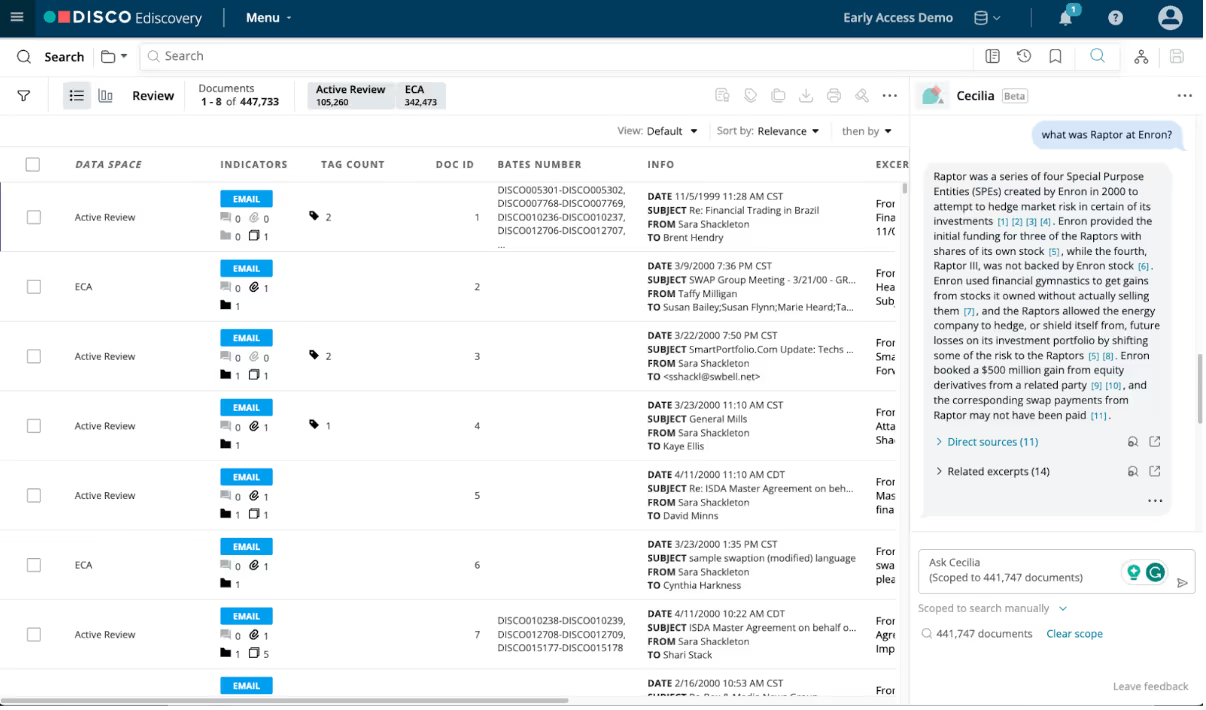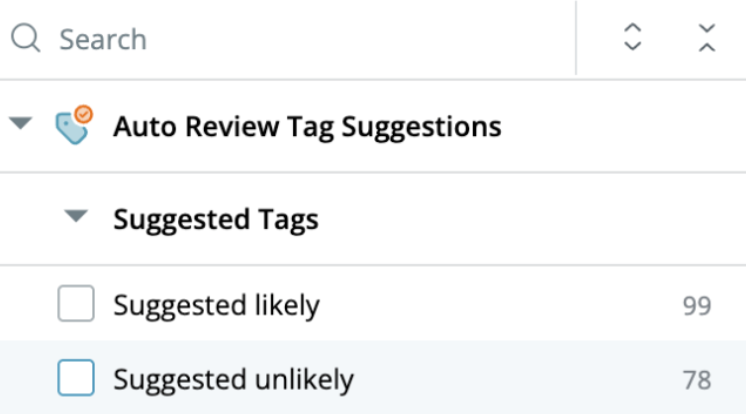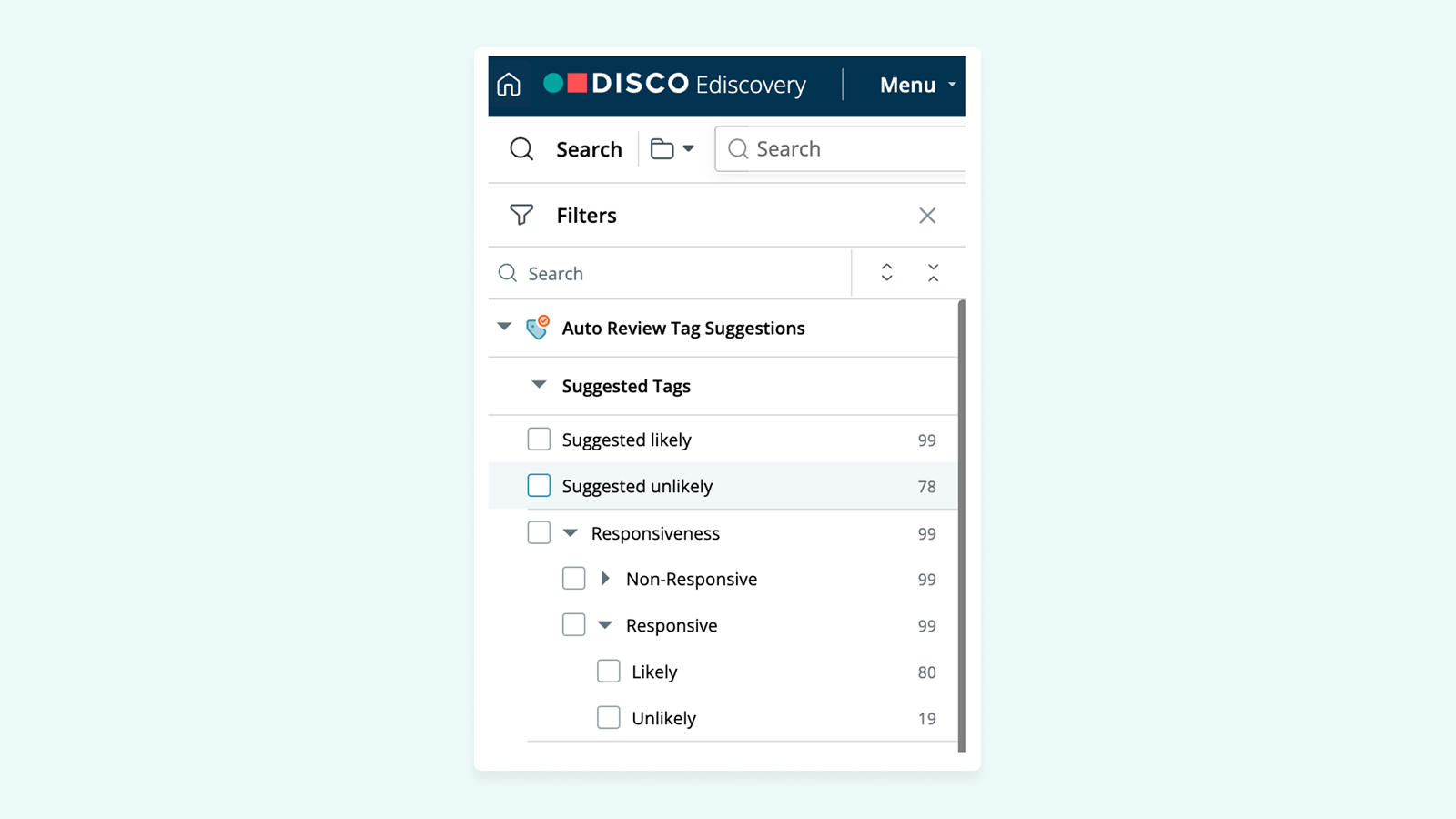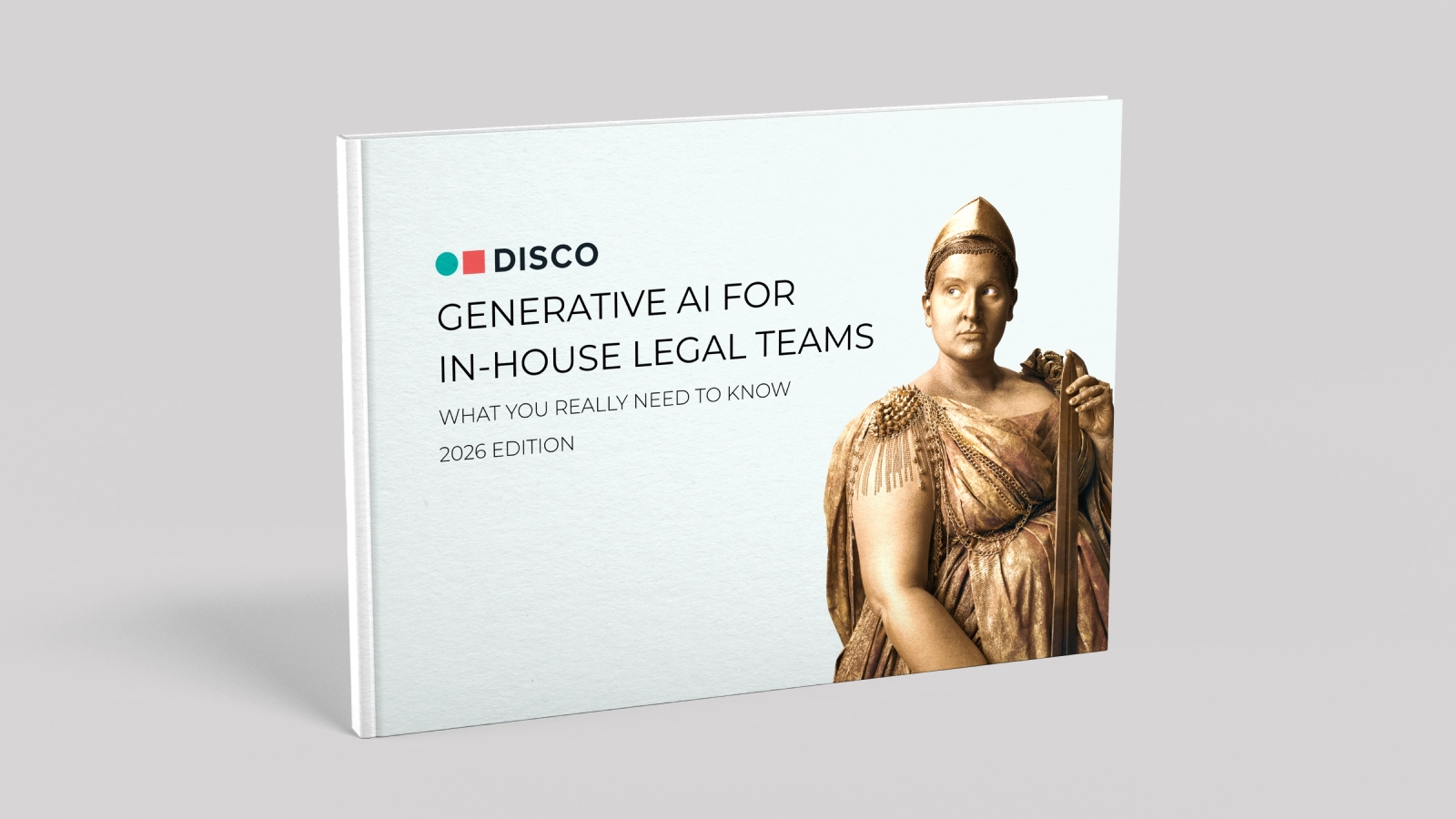⚡️ 1-Minute DISCO Download
Generative AI is raising tech-enabled contract analysis to a higher standard. With the help of AI, legal teams can efficiently assess contract terms, pinpoint important clauses, and anticipate possible legal issues – ultimately simplifying and expediting the contract analysis process. This article will discuss key benefits, potential challenges, and useful solutions for using generative AI for contract analysis.
Generative AI for contract analysis
According to Thomson-Reuters report on generative AI within corporate legal teams, 40% of respondents state they are considering using AI technology for contract analysis.
There are numerous ways AI technology can help with contract management:
- Parse and filter contract repository data. Deductive AI tools can parse an entire diverse contract repository, automatically assigning metadata values according to the extracted data. (Example: A user could easily filter for contracts that are up for automatic renewal in the next 90 days.)
- Automate contract drafting, as well as approval/workflow management.
- Reporting. Generative AI-powered reporting tools can quickly generate summaries and yield insights that would be extremely valuable to the executive team. (For example: A user could identify a recent trend in requests for amendments to payment terms, which may affect future expectations and strategies for the sales department.)
Contract analysis. In situations where speed and care are of the utmost importance, generative AI can enable legal teams to deliver with speed and accuracy. (For example: A sales rep is impatient for Legal to complete their evaluation of proposed red-lines, but even a small mistake can incur significant costs down the line.)
Why use generative AI for contract analysis?
Benefit: Quickly establish standard terms
“Grasping which terms are universally agreed upon is invaluable, as this insight enables lawyers to make informed decisions and streamline their negotiation processes.” – Katie DeBord, DISCO VP of Product Strategy
One of the advantages of using AI for contract analysis is the ability to quickly compare proposed contract terms to agreements that have already been accepted and executed.
Generative AI can identify key clauses and predict potential legal issues, making the process much faster than having your team manually peruse the terms of a proposed contract.
This gain in expediency can translate into a significant advantage for the company, enabling them to move rapidly through negotiation and signature, thereby reducing time to revenue.
Related reading: 5 Ways To Cut Legal Department Spend 💡
Using an in-house model? If you are using an in-house model (trained on language from your own contractual playbook) generative AI tools can highlight deviations from acceptable terms and trigger an approval workflow if necessary. This, of course, requires a significant investment of time and resources to build and test an in-house large language model (LLM).
Bought a generative AI solution? An out-of-the-box tool can begin working far more quickly. You can simply load in a contract, and ask generative AI to compare it to your company’s standard accepted terms. Then, you can query the tool, and the AI can provide the relevant information, pointing you to the in-line source of each specific insight.
Example: Generative AI-powered contract analysis in action
Acme Industries is a manufacturing company that makes Widget X. Acme’s in-house legal team consists of only three people – which has historically been enough to handle the company’s legal workload.
Recently, Widget X has grown in popularity due to the success of Acme’s new go-to-market motion. Acme’s sales force is large, international, and highly active. They are capitalizing on the current fame of Widget X to drive new business all over the Americas and EMEA.
As a result, the legal team – which is based in the U.S. – is virtually buried in potential buyers’ proposed red-lines to Acme’s standard contract. Many of the proposed clauses are unfamiliar and require careful review.
Predictably, the sales team is impatient with the time it’s taking the legal team to accept the contracts, and has complained to the CRO that Legal is causing them to lose business.
Claire, Acme’s General Counsel, knows that there is no time to hire additional contract analysts, or to invest in building an in-house AI model. She elects to partner with a provider that offers a generative AI tool that works out of the box. The generative AI allows Claire and her team to review each proposed contract in minutes by simply asking the AI about the contract’s key clauses, timelines, and more.
Now, where it previously took Acme’s legal team hours to carefully review each contract, it can take them only minutes to respond to a proposed agreement with either clear, targeted feedback, or approval – which enables Sales to move quickly to signature without compromising the company’s policies.
Using generative AI for contract analysis: Challenges and solutions
Challenge: Choosing the right model
A critical challenge of contract analysis with generative AI is choosing a model that has been trained on the appropriate legal language.
Most consumer AI products (including ChatGPT) have trouble parsing legal documents, especially considering the varied contract-writing conventions. A large language model that has not been trained to recognize and understand legal concepts may not be able to answer a legal team’s queries, or will not yield the desired results.
Solution: A model built for analyzing legal documents
If a corporate legal department opts not to train their own in-house system but instead purchase an out-of-the-box solution, care must be taken to make sure they select a model that was developed with these legal use cases in mind.
When questioning potential vendors, ask:
- Were lawyers involved in the development of this tool?
- Has it been tested by legal departments? Large law firms? Litigation boutiques?
- How does your solution grow in response to new research and technological advances?
Challenge: Data security
Customer data security is paramount. However, consumer AI products often do not come with the security guarantees required for legal work, and legal operations teams should never upload client data to a cloud environment that doesn’t maintain adequate protections.
Solution: A highly secure cloud environment
When questioning generative AI vendors, make sure they make security guarantees like the ones behind DISCO’s Cecilia. DISCO’s security program has been vetted and approved by enterprise organizations and large law firms worldwide. Critically, none of your company’s data is ever “fed back” into the system or used to train Cecilia; complete security and confidentiality is always maintained.
Challenge: Accuracy
Generative AI can make mistakes – and its propensity to state information authoritatively (“hallucinations”) can be misleading.
Solution: Human validation
It's essential for your legal experts to review and validate any data generated from AI.
Look for a tool that provides a textual explanation for its responses to your queries. DISCO’s Cecilia answers questions by searching for the most relevant content in your document, and then uses those sections to draft a narrative answer, with linked citations, so an attorney can easily validate Cecilia’s answers by consulting the relevant portions of the text.

Challenge: International languages
Many international businesses have contract repositories that span multiple languages. Legal text in one language loses meaning when literally translated into another. Many systems are unable to accommodate multiple languages, especially accounting for the variances in contextual meaning.
Solution: Train AI in languages and conventions
Select a tool with multi-language capabilities, and train the model on a good population of contracts in each of the languages your company commonly uses.
👉👉 See DISCO’s full suite of solutions for legal departments. 👈👈
Adopting generative AI for contract analysis: Actionable next steps
- Assemble a representative sample of contracts
Audit the contract types you use most often – NDAs, MPAs, employment agreements, and so on.
Use this knowledge to proactively guide your decision to build an in-house generative AI model or use an out-of-the-box one – this will lay the foundation for effective AI-driven contract analysis and enhance the reliability of the tech-derived insights.
- Prioritize language diversity and context
Be sure your dataset includes a diversity of legal terms and clauses. For example, if your company contracts with employees in the U.S. and EMEA, be sure to include examples of all applicable languages during training.
This will prepare your AI to provide accurate contract analysis and equip your team to navigate the intricacies of contracts across diverse regions and jurisdictions.
Bring generative AI into your legal workflows with DISCO
Ready to use generative AI to simplify your team’s work? DISCO is here to help.
DISCO’s ediscovery platform is a category leader with a user-friendly design, straightforward search, and streamlined data processing. And now, DISCO’s Cecilia AI is elevating the legal game with Cecilia Q&A (the AI assistant that can respond to questions about your case documents), Cecilia Timelines (AI-generated timelines that can provide a brief overview of important facts in minutes), and Cecilia Auto Review – plus, more thrilling developments to come.
See how we can transform your team’s work: Request a demo.
This article comes from our downloadable ebook, Generative AI for Corporate Legal Teams: What You Really Need to Know.
Check out the other articles in this series:


.webp)



%20(1).jpeg)









